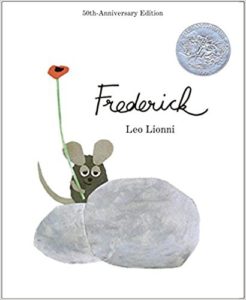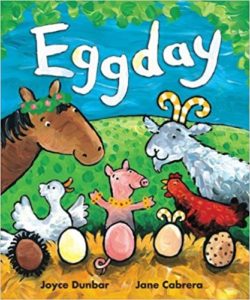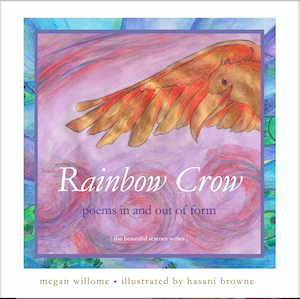The human soul needs actual beauty more than bread.”
— D.H. Lawrence
I’ve been teaching The Joy of Poetry this fall at our local Episcopal church, and for week 1, I brought a copy of Frederick to read aloud. A dozen people sat around a couple of long tables in the fellowship hall and listened while I read and showed the pictures. One man looked enchanted. Several people smiled. At the end, two women wiped away tears.
I did not grow up with this book. A friend gave me a collection of Leo Lionni’s stories for my children. We read them and liked them, but we weren’t over the moon about them. Then in the spring of 2015, when I was rewriting the manuscript for what would become The Joy of Poetry, I suddenly thought of dear old Frederick, gathering words for dark, cold days.
I was finally ready for the story. Sometimes children’s books don’t woo us the first time. Sometimes it takes decades for us to fall in love.
Frederick was published in 1967. The biography on the jacket of the hardback edition tells us Lionni was born in Holland and was a self-taught artist who learned to draw by copying the works of the masters in Amsterdam. (Not a bad way to learn.) In 1984, he received the American Institute of Graphic Arts Gold Medal. He won four Caldecott Honor awards, and Frederick is one of them. Why didn’t Frederick win the Caldecott in 1968, when it was eligible? I don’t know — awards are strange things. What won that year was Drummer Hoff by Barbara Emberley, illustrated by Ed Emberley. I do know Frederick’s words and colors and warmth have nourished generations as surely as they nourished the four little field mice warm in their stone wall den. When asked where he got his ideas, Lionni answered, “And so, to the question ‘How do you get your ideas?’ I am tempted to answer, unromantic though it may sound, ‘Hard work.’”
The jacket cover describes Frederick this way: “Here is the fable of Frederick, the dreamer and poet, whose endless store of supplies warms the hearts of his fellow field mice and feeds their spirits during the coldest, darkest days of winter.” Yes, that description feels like a fable — simple, straightforward, essentially a story that is an extended prose poem, along with illustrations in the form of collage. That means, dear readers, look for the shapes. That rock looks like a peppermint candy. Those leaves look like stars. How does Lionni draw ants in such a way that they look happy? How is it possible to convey so many different emotions through mouse eyes that are basically two concentric circles?
When I read this book to my class, in a town founded by German immigrants whose descendants still value hard work, I became aware that in the early pages of the book, Frederick could be viewed as a shirker. All the other mice “began to gather corn and nuts and wheat and straw. They all worked day and night. All—except Frederick.” On each page, he’s sitting by himself, eyes partially or completely closed. On one page his back is turned.
“Frederick, why don’t you work?” they asked.
“I do work,” said Frederick.
“I gather sun rays for the cold dark winter days.
Part of me wants to roll my eyes. Ah, but Lionni is wiser than I. (He should be; he earned a Ph.D. in economics from the University of Genoa.) He knows there is more to commerce than what we can carry and store in stone dens.
Frederick does not reveal his treasures at the beginning of winter. He allows the mice to eat their nuts and tell their tales “of foolish foxes and silly cats.” He lets them get hungry.
But little by little they had nibbled up
most of the nuts and berries, the straw was
gone, and the corn was only a memory.
It was cold in the wall
and no one felt like chatting.
Before he shares with his hungry fellows, Frederick waits to be asked: “What about your supplies, Frederick?” they asked. Only then does he share his warmth, colors, and words. Now it’s the field mice who have their eyes closed and who eventually turn their backs to the reader to listen and ponder. And it is Frederick whose eyes are open, who speaks “as if from a stage.” Here is the poem he’s been storing:
Who scatters snowflakes? Who melts the ice?
Who spoils the weather? Who makes it nice?
Who grows the four-leaf clovers in June?
Who dims the daylight? Who lights the moon?
Four little field mice who live in the sky.
Four little field mice … like you and I.
One is the Springmouse who turns on the showers.
Then comes the Summer who paints in the flowers.
The Fallmouse is next with walnuts and wheat.
And Winter is last … with little cold feet.
Aren’t we lucky the seasons are four?
Think of a year with one less … or one more!
I’d prefer to end the poem with “little cold feet,” but whatever. The poem gives us a fable within the larger fable of the story. On our level, Frederick answers the question, Where do seasons come from? On another level, the question is, Why do hard times come? The answer is, It’s a cycle, we have what we need, and this too shall pass.
There’s another, larger, colder, darker winter happening that serves as the background for this tale. The first page contains no mice, just this sentence: “All along the meadow where the cows grazed and the horses ran, there was an old stone wall.” These mice are all that’s left of a once-prosperous farm: “But the farmers had moved away, the barn was abandoned, and the granary stood empty.” Lionni shows us that there are economic cycles as well as meteorological ones, just as our personal lives cycle through seasons. We harvest now, knowing someday we might need our own words. Or someone else might.
Which is why it’s good to be a poet (or a painter or a woodworker or a musician) — someone who stores beauty to share later. There are days when I feel like being a creative person requires too much work, too much care and feeding when compared with regular humans. But it’s not only for me that I take the time to half-close my eyes, my face toward the hummingbirds feasting on my Turk’s cap bushes. I do it so I can take up my pencil and write in my notebook. And later, in a different season, when I share about those red blooms and the whirr of those wings and someone says, You are a poet, then, like Frederick, I can shyly accept the compliment.
The last page of the book is the only time we see Frederick’s full face. He’s standing on a stone, blushing and smiling. One hand is behind his back, and the other covers his mouth. He knows his work is as valuable as everyone else’s.
_______________
Other children’s books about finding and sharing beauty
Aesop’s Fables: A Pop-Up Book, Agnese Baruzzi (if you need more fables in your life, which you do)
The Mixed-Up Chameleon, Eric Carle
Olivia Saves the Circus, Ian Falconer
Possum’s Harvest Moon, Anne Hunter
Swimmy, Leo Lionni (don’t you want to read more Lionni?)
Lentil, Robert McCloskey
The next Children’s Book Club will meet Friday, November 10: We will read Eggday by Joyce Dunbar, illustrated by Jane Cabrera. Because we all need to laugh.
Photo by Tom Bech, Creative Commons, via Flickr. Post by Megan Willome, author of The Joy of Poetry.
Browse more children’s book club
“Megan Willome has captured the essence of crow in this delightful children’s collection. Not only do the poems introduce the reader to the unusual habits and nature of this bird, but also different forms of poetry as well.”
—Michelle Ortega, poet and children’s speech pathologist
- Perspective: The Two, The Only: Calvin and Hobbes - December 16, 2022
- Children’s Book Club: A Very Haunted Christmas - December 9, 2022
- By Heart: ‘The night is darkening round me’ by Emily Brontë - December 2, 2022




Bethany R. says
Enjoyed this post and the book. I like how you explain both what you connected to in the story, when you were writing your own, and what might make you roll your eyes.
“Sometimes children’s books don’t woo us the first time.” It’s interesting how a book (song, color, poem) can nourish us differently in various phases of our life. I wonder what stories I will like in five years that I don’t particularly resonate with now.
Megan Willome says
Bethany, that’s such an important perspective. So much of what we like or don’t like is filtered through our experiences.
L.L. Barkat says
I’ve been thinking about this book all morning.
I definitely felt a little like the field mice who worked so hard to bring in food—why did Frederick not have to work, too? This seems like such a real and deep question, about how we take care of ourselves and who does what to make that happen.
Then I thought how nice it would be if people would take care of those who take care of the soul. Patrons. We need Frederick patrons. 😉
Then I thought about those simple circles—how little we need to make something happen sometimes. It comes with the perspective and the power inherent in that. Just the tiniest shift can change everything, so it seems.
Megan Willome says
The more I read this book, the more I think it needs to be taught in a behavioral economics class. Obviously, we need folks who gather food, who put out fires, who tend the injured in an ER. We also need Fredericks, and possibly, as you suggest, patrons.
Katie says
Megan, thank you SO much for this meaningful tour through Frederick, one of my all time favorite fables. You are a wise and winsome guide. This brought to mind memories of reading aloud with my children when they were young. Gratefully, Katie
Megan Willome says
Katie, I love that you read aloud to your children! That’s a subject we’re going to talk about more here at Tweetspeak–it’s so good for both the listener and the reader.
Katie says
Reading aloud to my children was one of my most favorite activities to do with them. So many good series to share such as: Little Britches by Ralph Moody, The Chronicles of Narnia by C.S. Lewis, Little House of the Prairie by Laura Ingalls Wilder, The Boxcar Children, E. B. White’s books, Robert McCloskey’s, Lois Lenski’s, Landmark Books, biographies. . .
Have you heard of the Read-Aloud-Revival (RAR) website by Sarah MacKenzie?! SO good! She is introducing her generation to many of the classic children’s books as well as many wonderful new authors.
Megan Willome says
No, I don’t know about that website. I’ll check it out!
Katie says
Definitely worth a look!
Hope you enjoy:)
Donna Falcone says
Frederick is definitely a mouse to remember! I love what you say about readiness: “I was finally ready for the story. Sometimes children’s books don’t woo us the first time. Sometimes it takes decades for us to fall in love.” It’s so interesting and it shines a light on the need to not force anyone, child or adult, to ‘see our point’ or ‘get the lesson/point’ of a story. Every reader arrives to the station at different times, and sometimes we all arrive at different stations, don’t we? I love that you said that about readiness!
And, we notice that Frederick did not starve, did he? The community saw to everyone’s physical needs…. and Frederick’s ‘warehouse’ was not kept just to himself – I love that. No one hoarded… everyone had something of value to offer. What a nice little mouse community. 🙂 Authors can share their dreams for the future in the most understandable ways…. Lionni was, through his stories and art, a social activist. 🙂
Megan Willome says
Indeed he was, Donna. I also like what you’re saying about some of us arriving at different stations. It’s so true, and we need to leave space for that.
Sandra Heska King says
I found Frederick! He was lying on top of a small white file box and under a stack of books–The Art of Stillness, Winnie-the-Pohh, Everything That Makes You Mom, and The Magician’s Elephant.
I have a paperback so I don’t have that jacket description. I wrote it on the front flyleaf. Dear Frederick looks so dreamy and half asleep throughout the book, though when the mice are heading to the hideout, he’s still looking behind him–gathering maybe the last dregs of beauty.
I love what you say here: “We harvest now, knowing someday we might need our own words. Or someone else might.” It makes me feel better about “wasting time” rocking on the patio. And memorizing the words of others who have found beauty in order to pass them on–well, that’s gathering, too.
You also shared one of my mom’s favorite bits of advice. “This, too, shall pass.”
I’m so relieved I found Frederick!
Megan Willome says
Sounds like your Frederick was keeping some good company. Perhaps he was hiding.
Love your idea that memorizing is a sort of gathering as well.
Sharon A Gibbs says
Megan, I agree; this book should be taught. Thank you for revealing all the important messages tucked away in this fable. (I have come back to this several times to gather and store the beauty and truth of your words.) Frederick climbs to the top of my “Favorites” pile.
Surely, the other mice must have thought Frederick was “wasting time,” but they showed such grace towards him—even before they understood (and reaped) the benefits of his “work.” I love how accepting, giving, and receptive they were—a message in itself.
Megan Willome says
What a great point about Frederick’s friends, Sharon!
Rollie Hatch says
I recently read this with my daughter for the first time and I definitely experienced an impression of Frederick as a shirker as the story initially unfolded. I worry that my reaction left too much of an impression, as she has focused on his sleeping on subsequent readings. We’ve since discussed deeper themes like the community value of variety in occupations, visualization and thinking warm thoughts, even the science of blushing. This is really a deep book!
I’ve even briefly considered the possibility that Frederick only existed in the imagination of the other four unnamed mice (or maybe was initially their personification of laziness, and later became some sort of faith-based figure), but this may just be my wild conspiracy theory. That poem about the four seasons planted the idea.
Megan Willome says
Hi, Rollie. You have certainly seen sides of Frederick that I never have. But isn’t that what’s great about a good book? It can stir and hold so many different ideas at once.